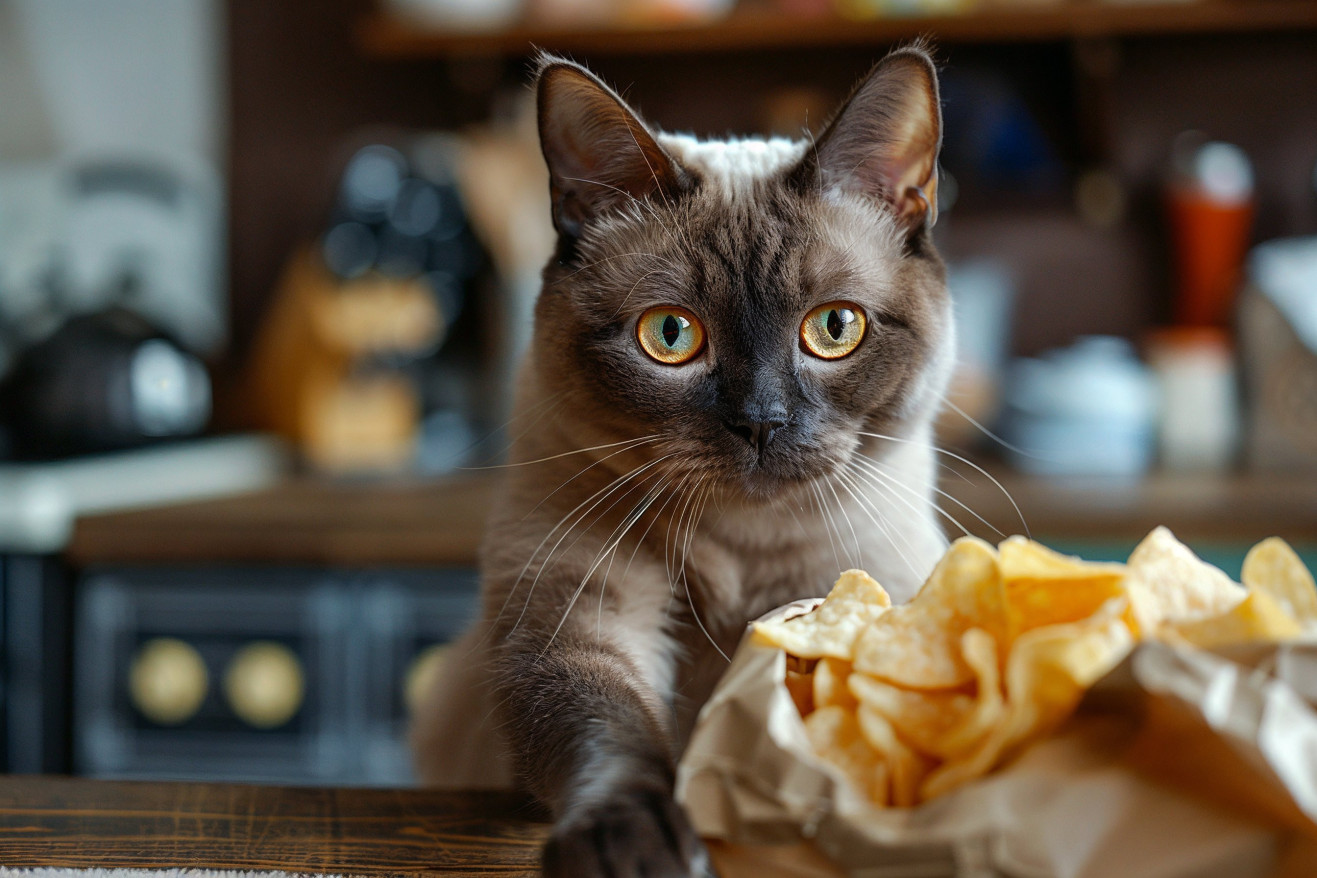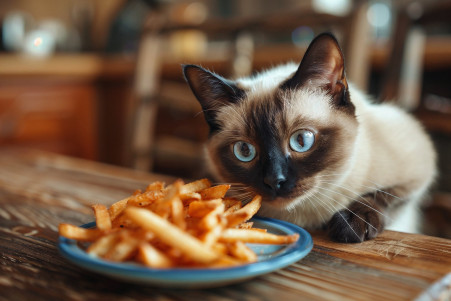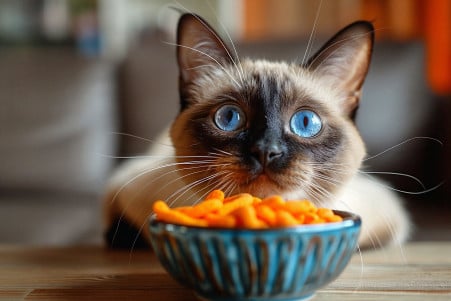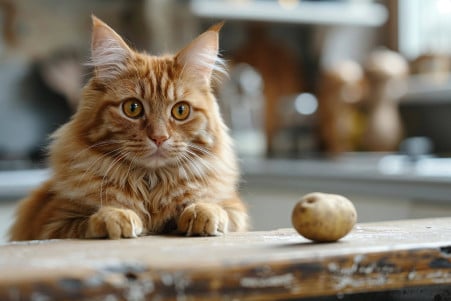Can Cats Have Potato Chips? A Science-Based Investigation
5 April 2024 • Updated 3 April 2024

If you’ve noticed your cat staring at your potato chip snack, you might be wondering if it’s OK to give them a few. Unfortunately, potato chips are not a good choice for cats due to their high fat and salt content and other seasonings that can be toxic to cats. Instead, you should feed your cat treats and cat food that’s been designed to meet their specific dietary needs.
That said, cats are obligate carnivores and potato chips are not nutritious, but there is some evidence that suggests that there are potential dangers to cats even if they eat a small amount of these types of foods. In this article, we’ll take a look at studies that have been done in veterinary medicine on the impact of foods like potato chips on cats. This science-based investigation will help you understand whether or not the occasional treat is really bad for your cat. And in the end, it will help you decide whether or not you want to feed your cat human food in a way that’s safe and healthy.
Can cats eat potato chips?
Health Risks of Potato Chips for Cats
In addition to being high in fat, potato chips are also high in sodium, which can cause a number of health problems for cats. According to Purina, even small amounts of potato chips can be harmful to cats because of their high salt and fat content. The high levels of sodium in potato chips can lead to salt toxicity or sodium ion poisoning, which Meowbox explains can result in vomiting, diarrhea, depression, seizures, and death.
In addition to the dangers of salt and fat, many potato chip flavors include seasonings like onion or garlic powder, which are toxic to cats. VetStreet explains that these seasonings can cause damage to red blood cells and lead to anemia. Other ingredients in potato chips, such as artificial colors and preservatives, can also be harmful to cats if they consume them regularly.
Although eating a single potato chip is unlikely to cause immediate harm, Hepper points out that even small amounts of potato chips can interfere with a cat's nutritional requirements as obligate carnivores. The empty calories from fat and carbohydrates are nutritionally void and can lead to obesity and other health problems in the long run if they become a regular part of a cat's diet. By avoiding these unhealthy human treats, you can help ensure your cat's health.
Symptoms of Salt Toxicity and Safe Levels for Cats
Eating too much salt from potato chips can result in salt poisoning or toxicity in cats. As noted by Catster, symptoms of salt toxicity can include vomiting, diarrhea, increased thirst, lethargy, tremors, and seizures in more severe cases. The Pet Poison Helpline lists salt as having a moderate to severe toxicity rating in cats, so any worries about salt consumption should be discussed with a veterinarian.
While a small amount of salt is not dangerous, Sparkle Cat notes that larger amounts from salty snacks like potato chips can be harmful. Cats should have about 0.5 grams of salt per 1,000 calories, so even a few potato chips could exceed this safe level. It's important to practice moderation and best to avoid giving cats any meaningful amount of potato chips or other salty human foods.
In addition to the dangers of salt, potato chips often contain other problematic ingredients that can be toxic to cats, which we'll cover next.
The Ingredients in Potato Chips Can Be Toxic to Cats
In addition to the high levels of fat and salt, potato chips are often loaded with seasonings and other ingredients that can be harmful to cats. For example, the ASPCA notes that onion or garlic powder, which are often found in flavored potato chips, can cause gastrointestinal upset and damage red blood cells in cats. The ASPCA also points out that the artificial colors, preservatives, and other chemical additives found in potato chips can be harmful to cats if they're ingested in large amounts.
It's important to always check the ingredients in any human food before giving it to your cat and avoid giving them anything that contains these potentially toxic ingredients. As VetStreet explains, even small amounts of these additives can be toxic to cats. Stick to treats that are safe for cats to ensure that your furry friend stays healthy and happy.
Healthy Snack Options for Cats
Instead of potato chips, there are many human foods that are safe and healthy for cats to eat as treats. BeChewy lists some of the best options, including cooked lean meats, fish, eggs, cooked vegetables like carrots and peas, and small amounts of fruits like bananas and blueberries.
According to Purina, these treats should be given in moderation and should make up no more than 10% of a cat's daily calorie intake. The Honest Kitchen also notes that it's important to introduce new foods gradually and watch for any negative reactions since individual cats can have different dietary sensitivities.
By offering healthy, cat-friendly snacks in the right amounts, you can help your cat enjoy their favorite human foods without sacrificing their health. That said, if your cat is used to eating unhealthy treats, it's important to be mindful of the need to help them make the switch to a healthier diet, as we'll discuss in the next section.
How to Change Your Cat's Diet and Stop Begging
If you have been feeding your cat junk food, like potato chips, it can be hard to change their diet, but it's important to do so for their health. According to Cats Exclusive, the change should be made over a few weeks or months, with new foods being introduced slowly and the junk food being phased out.
Feeding your cat at specific times, as suggested by The Cat's Meow Veterinary Hospital, and using food puzzles can help keep your cat from begging for junk food. Canagan Pet Food also recommends not giving in to your cat's begging to help them stop the behavior. In some cases, you may need to work with a vet or animal behaviorist to help your cat overcome begging, especially if they have an underlying health condition.
With these changes and interventions, cat owners can help their cats overcome their junk food addictions and begging behaviors.
Conclusion: The Importance of a Healthy, Well-Balanced Diet for Cats
Although a potato chip here and there won't cause any immediate damage, it's probably best to avoid giving your cat junk food entirely. Cats are obligate carnivores and have very specific dietary needs that can't be met by the snacks that humans eat, including potato chips.
To keep your cat healthy, it's important to make sure they eat a well-balanced, high-protein diet that's specifically formulated for cats, with the occasional safe treat. Knowing the dangers and making sure to feed your cat a healthy diet, cat parents can make sure their cats are healthy and happy for years to come.


